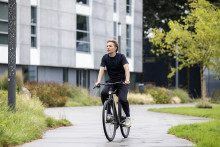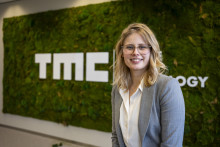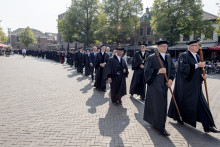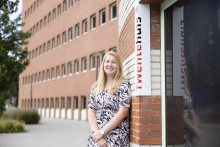You have been part of the Young Twente Board for about three years, the last year as chairman. Why did you choose that position?
'I grew up in Enschede, and Twente was always my home base until the last part of my studies. I wanted to leave the nest and chose a cool graduation assignment at Albert Heijn in Amsterdam. I was able to work in eCommerce and that was top notch in terms of work. But on a social level, I missed the conviviality and space of Twente, I couldn't quite settle in Amsterdam. When I took the train to Twente, I had the feeling of going home. The outward journey felt like a return journey, rather than the other way around. Colleagues from Brabant and Limburg recognised that feeling.
I decided to return to Twente and wanted to get to know the region in a different way. That choice also came from a place of pride and ambition. I sensed that people around me thought: 'What are you doing in Twente?' I felt the urge to show how cool Twente is and how many opportunities there are. A role within Young Twente Board (YTB) seemed like the perfect opportunity to get to know the region better, but also to put Twente on the map.'
job bijvank (31)
 Chairman Young Twente Board
Chairman Young Twente Board
UT alumnus international business administration (2012 – 2018)
Senior Manager eCommerce Albert Heijn, Ahold Delhaize
Putting Twente on the map. How?
'Sometimes we have to figure out how we can make our voices heard. Our main message is that young people must be included in decision-making, because that happens far too little. In the region, politics and business: everywhere people don’t consider generational differences. Long-term decisions often cover a period of ten or twenty years. But decisions are made by the generation of the decision-makers. Therefore, you have to include several generations in that.
As Young Twente Board, we try to give direction: which direction do we want to Twente to go? What kind of business climate, what kind of living climate and via which educational climate? I am proud that the YTB had a lot of influence last year. We made it clear that young people are no longer looking for an expensive car in front of their door, but are worried about the future. Will I be able to buy a house? Is there enough happening in the field of climate? Will there be a world to live in in the future? Young people are looking for meaning and want to contribute to a better world, to be part of something. This is a challenge for many companies in Twente. If you want to be an attractive employer, you have to take extra steps in sustainability. For many young people, just growing is not enough.'

How do you try to bring that about?
'By acting as a youth sounding board for the region. We enter into dialogue with institutions and fulfil a driving function, for example when it comes to culture. We are working with cultural institutions on this. We want to make large investments and that requires subsidies. Take Douwe Egberts in the centre of Enschede. This is a place where many international students come together to meet, a kind of home base. That's positive, but it's actually born out of necessity. The more we create such places, to promote encounters, the better. That's what we're fighting for in the city council. The municipality needs to continue to invest in order to remain attractive and thus retain talent. Whereas in recent years the YTB have mainly been in an advisory role, we increasingly want to have a say at the administrative level and influence investments.'
'Making decision-making concrete for young people is not easy. That only happens when something becomes very visible, or starts to hurt'
'I look at that with great concern. As a student, I was able to experience how enriching it is to carry out a project with students from all over the world. It is impossible to tackle the challenges this region faces without international students, it will not work. The Netherlands wants to remain the market leader in semiconductors, an important growth driver. With our application for Project Beethoven (national investment in the microchip sector, ed.), we as Twente Board have shown what we want and can do for the Netherlands. But, it has to be facilitated. It is a missed opportunity by the government that a disproportionate decision has already been taken, without input from the regions.
What makes me positive, is that we as Twente were able to unite in such a short time and really created a counter-message for the first time. We are making our presence felt more than before. The chairs of boards, such as those of our educational institutions, are also more visible on the national battlefield. That's good to see, but it's also necessary to become future-proof.

What is your biggest concern?
'That the outline agreement is in contrary to the plans in Project Beethoven. The ambition in chip technology is enormous. Supporting ASML is the tip of the iceberg. Too little consideration is given to the layers below.
And I am shocked by the policy that is currently being discussed by the government, with a strong emphasis on migration and the Dutch language. I do not think we understand the consequences of this for the economy and sustainable growth. As the Netherlands, but also as Twente, we facilitate a lot of innovation and this supply channel is now being cut. That's going to cause enormous pain in the future.'
Do you notice that this concern is also alive among young people?
'I often see an imbalance between micro and macro. What do the consequences of a decision mean for me and what do they mean for a country or region? Many young people often think mainly of the former. Making decision-making concrete for young people is not easy. That only happens when something becomes very visible, or starts to hurt. For example, when my parents' care is under pressure, because there are not enough hands at the bedside or the technology is not yet advanced enough. But I think that many young people don't have such a strong opinion about the Dutch language at a university. Such themes are difficult to draw attention to.'
'If you have the ambition to do business, Twente is the perfect region to achieve that'
What makes Twente a great place to settle as a young person?
'It is a region that is doing well on the axis of prosperity. That may not sound very appealing, but Twente has a lot to offer. There are many opportunities for self-development, for living pleasure, beautiful cities with good facilities, and if you like peace and greenery, there are many housing options for affordable prices. And underexposed: if you have the ambition to do business, Twente is the perfect region to achieve that. We have a huge SME sector with more than 15,000 companies and we wish each other success. Networking and sponsorship organisations are happy to help young entrepreneurs move forward. The social network is rock-solid.’
What can the region do better to engage young people?
‘Proclaim. As a region, we are too modest. We do great things, but we act like it's the most normal thing in the world. Twente can also be more accessible to international people. We are sometimes too anxious and reluctant to do so. Offer someone a job, combine it with a Dutch course so that they can at least understand the language, let them talk back in English and see how it works. We think in terms of problems instead of opportunities. The job market is so tight, just give it a try.'
roots

This interview was previously published in career magazine ROOTS, a new initiative of U-Today. In this magazine we want to connect students and companies. We do this by bringing stories of starters on the labour market and by placing advertorials. In this way, companies come into the spotlight of students and students get an idea of the life that awaits them and what opportunities there are in the region.
Are you a recent graduate (<5 years), do you live and work in the region of Twente, Achterhoek or just across the border in Germany and do you want to share your story? Or do you want to advertise as a company? Let us know via [email protected]
support
 The career magazine ROOTS has been made possible with financial support from the Province of Overijssel and Twente Board.
The career magazine ROOTS has been made possible with financial support from the Province of Overijssel and Twente Board.






